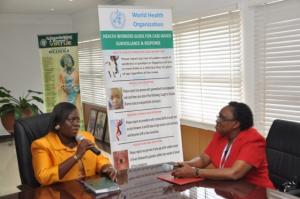Deputy Governor becomes Disease Surveillance Ambassador in South-West Nigeria
Abeokuta, Ogun 22 September, 2015 - The Ogun state Deputy Governor Chief (Mrs) Yetunde Onanuga in south-west Nigeria has offered to become an ambassador for disease surveillance during an advocacy meeting with the World Health Organization (WHO) state team on 22 September, 2015 at the Government House in Abeokuta.
Chief Onanuga assured the team which also presented her with surveillance roll-up banners that “I will strategically display the banners in my office and also be an ambassador for disease reporting in the state”.
Ogun state has a surveillance population of 2.3 million and three of its local government areas (LGAs) share international borders with the Republic of Benin with most of its population involved in daily cross-border socio-economic activities. The state is also bordering Lagos state that reported the index case of the Ebola virus disease in July 2014. Therefore, WHO has deployed significant resources in the state to support the government to quickly identify report and investigate disease events that could spread internationally, also referred to as public health emergencies of international concern.
The deputy governor therefore gave the assurance that human and material resources will not be spared in strengthening the health systems and sensitizing communities along the borders for timely disease reporting and also close potential surveillance gaps.
Dr Mejebi Philips, the WHO State Coordinator had earlier made a presentation to the deputy governor on efforts to close immunity gaps in the state and gave a situation analysis on the preparation for the measles campaign, dwelling much on the gaps identified during the microplanning process for which WHO is supporting Ogun to target the vaccination of 4,932,826 children.
The deputy governor affirmed that the state will address the concerns that WHO identified during the microplanning process as well as the shortfall in cold chain equipment for the measles campaign.
Furthermore, Dr Phillips further seized the opportunity to inform Chief Onanuga that “the surveillance performance indicators for polio and other childhood killer diseases have been encouraging” adding that “we will continue to provide the requisite technical support to the state to implement activities to sustain the interruption of the wild polio virus in the state”.
WHO is working closely with the government in Nigeria at federal, state and local government levels to attain and maintain certification standard surveillance performance for polio eradication by 2017 with emphasis on high risk areas including international border communities.
_____________________________________________________
Technical contacts:
Dr Fiona Braka; Tel: +234 703 170 5252; Email: brakaf [at] who.int (brakaf[at]who[dot]int)
Dr Mejebi Philips; Tel: +234 802 337 5933; Email: philipsme [at] who.int (philipsme[at]who[dot]int)
Media contact:
Ms Charity Warigon; Tel: +234 810 221 0093; Email: warigonc [at] who.int (warigonc[at]who[dot]int)



